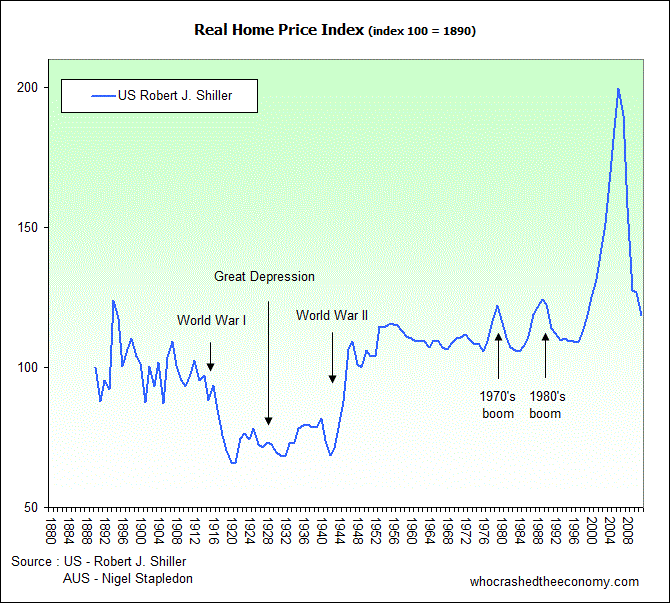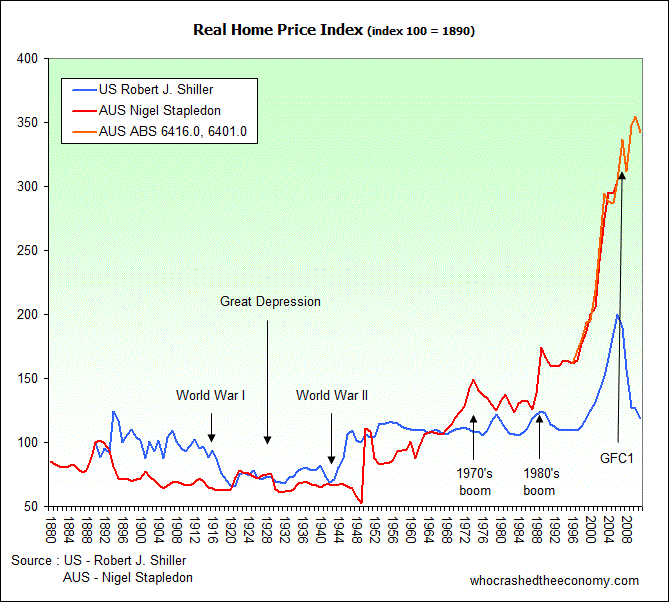According to the Australian Associated Press, Harry Dent has arrived in Australia today to promote his new book, “The Great Crash Ahead: Strategies for a World Turned Upside Down.” Amazon suggests his book will be released on the 20th of September.
In promoting his book, Mr Dent has told AAP, he believes the world will enter a deeper downturn early to middle next year, originating from Europe and spreading to the U.S., China and eventually Australia. At the centre of the world wide debt crisis is, off course, Real Estate. This should sound quite familiar with readers here.
“People in places like Sydney or Tokyo or Miami say, ‘Hey, real estate can never go down here, we’re a great place, everyone wants to move here, there’s not much land for development’, and what I say is that is exactly the kind of place that bubbles,” Mr dent told the AAP.
He believes Australia’s house prices will return to levels seen in the late 1990’s and early 2000. With house prices in Australia at giddy heights, such a prediction can be hard to stomach. But it’s by no means far fetched. The United States has just done this as our readers will know from a post published early last month :

Now this is Australia’s housing market overlaid on the same graph. As our market grew just a teeny bit more thanks, in part, to Kevin’s First Home Vendors’ Boost in 2008, we had to rescale the graph :

» Tsunami to hit Australian real estate – AdelaideNow, 11th September 2011.
» Tsunami to hit Australian real estate – Sydney Morning Herald, 11th September 2011.

Wow! Australia can really punch above its’ weight.
If prices went back to late 1990s early 2000s prices I would be one very happy little Vegemite. Sadly for many the boom has been going for so long they think it is here to stay.
The market won’t crash here until changes are made to the Negative Gearing Tax Rort.
Um the Australia chart seems to be misleading surely?
Without looking too far, could 1890 be a bad place to start as a zero point for Australia and give a misleading result?
In 1890 would house prices here compared to the states perhaps be a lot cheaper, and thus our price gains since then look quite large. Id like to see the exact same chart but with a zero point being say sometime in the 70’s or 80’s.
Oh My goodness. Up in steps and down in floors.
There is no bubble. Australia is well placed. Resilient Economy. Thanks Mr Wayne, I believe you – NOT !!!!!!!
The Aussie banks are suffering today, so is the average persons person superannuation indirectly.
Cashed up investors will be the winners here. Be careful catching a falling knife.
To survive the incoming “economic tsunami”, Mr Dent said investors should sell their excess real estate and buy up assets in US dollars.
Keep this in mind. The sole purpose of this guy’s world tour is to sell the falling US dollars (=cut paper).
Do you prefer a real house in Australia (which price may go up and down), or do you like cut paper?
The choice is yours.
Use the RBA inflation adjuster to mock up y2000, or y2004 prices adjusted for inflation to todays money. (My thought is a return to y2004 prices.) *Also done in the knowledge that property is excluded from cpi*
http://www.rba.gov.au/calculator/
His prediction of prices going back 10 years would be great to see. Unemployment would have to rise significantly (it’s sleadily increasing) and availability of credit would have to dry up.
Blue Line says: That’s not a bubble.
Red Line says: This is a bubble.
RBA says: No bubble here-move along.
@ Average Bloke,
Surely you jest! Even with changes to the negative gearing, what about your other sacred cow – China?
You look at how credit has dried up, that’s all you need to know to predict that house prices will continue to fall, when you consider where Aussie banks have to go to get money, and that money doesn’t exist (it never did), financial wealth will be cut back to be more in line with economic wealth, basically the destruction of paper wealth.
Is the Chinese Economy collapsing Max?
No, changes to negative gearing aren’t needed for a house price collapse. It seems the love affair with property hoarding is hitting a rough patch. I’d say its more about sentiment. And judging by the auctions I have been to in my local area, the re industry here is in panic mode. Negative gearing will get dumped when the baby boomers are done with it.
@ Average Bloke,
If you trust the numbers coming out of Chinese (ahem… communist) government, it is in overdrive.
I didn’t mean to poke fun at you, it is just that you made your argument about negative gearing being the ultimate floor under the housing prices numerous times here and elsewhere (I assume you post on other forums/blogs under the same name). However, you never give (or I missed it?) your reasoning for this belief. I am honestly interested why you think negative gearing provides the ultimate floor. To me this point is flawed, because without constant price increases negative gearing, even is a flat market, is a kiss of death to any investor, faced with financing a loss in his investment every time a mortgage payment is made. Even a tax offset resulting from negatively geared investment properties diminishes the pain, bu does not remove it – tax refund is a proportion of money spent on financing the negatively geared property. So I am at a loss why you think negative gearing plays such an important role. It certainly prolongs the pain, but does not remove it. Or am I missing something?
I take your point on board Max.
I often have to distinguish between Long Term Investors and the Unexperienced Short Term Investors that have jumped in during the last few years.
The Short Termers will get burned but the Long Term Investors will not. The whole point of Long Term Property Investing is to hold multiple properties for as long as possible, NG assists in this process.
The market is changing as Australians are starting to realize that there just might be some risk in holding Housing as an investment. Its part of the cycle. The housing crash will lose its steam when the job market gets worse. The Negative gearing would be just more salt added to the wound. People will by properties if they know their job is safe but with unemployment rising and looking to get worse thats what will crash the market.
@ Average Bloke,
I see where you are coming from. It is true that unexperienced short-term investors will get bled first, but even long-term investors will suffer in a flat market, since, mathematically, it costs them money every month to support their investment. This cash outlay, unless 100% offset at the end of the financial year by a tax refund, will mean their cost of holding property will be larger than the revenues received from this property, so they are hemmoraging cash. Some people can keep it up for a while in hopes of the market turning upwards, but the end result is the same, compliments of mathematics – net loss. That is the issue with Negative Gearing – financing the investment in hopes of recouping the losses through capital gains.
In the declining market, where property values are dropping, I would imagine the long-term investors will be even more vulnerable, because of my thoughts on property owners vs. renters make-up, but that is a different topic of discussion.
I appreciate your input.
@Max
You are spot on about NG it is a joke when prices fall or stay flat for some time. Please dont try to explain this to Averagebloke, he will never to except the truth. He clings to the dream that in the longterm NG will work but this only hold true if the market is on a bull run over say 10 years. This will not happen again until the price of a house vs incomes reverts to the norm and the only way that can happen is a crash or a long flat stage over the next 5 to 10 years. So as far as NG dont go there untill the crash has happend unless you want to get smashed big time!
What did I tell you guys?
Lets not forget our highly inefficent and restrictive “British” style town planning practices that have managed to greatly reduce the supply of available building land. Amazing we have a land “shortage” in the most sparsely populated country in the world!